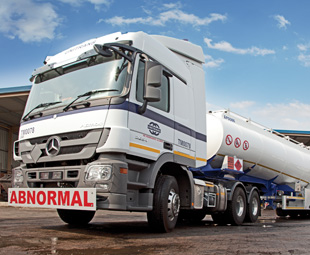Innovative across Africa

BRUCE FRASER, general manager technical, Unitrans Supply Chain Solutions, talks about how the company has woven innovative performance standards into its daily operations
The Performance-Based Standards (PBS) programme is a legislative initiative in the road transport sector with the objective of improving the operational dynamics of vehicles. It differs from conventional road transport legislation, where standards are prescribed in terms of the dimensions and physical parameters of a vehicle.
PBS offers the heavy-vehicle industry the potential to achieve higher safety and productivity levels through optimised vehicle design. Unitrans has adopted an innovative approach involving performance standards in operating and evaluating vehicles to ensure road safety and infrastructure protection.
A focus on innovation in the road freight sector has various economical and environmental benefits, whereby optimally designed heavy-vehicle combinations decrease carbon emissions, reduce kilometres travelled and lower supply chain costs.
The benefits of Unitrans PBS vehicles include: increased safety standards; reduced environmental impact; a reduction in fleet requirements; and a decrease in supply chain cost.
The innovative design of PBS vehicles and the use of new technologies, allow for the manufacture of safer and more productive vehicle combinations. This, in turn, causes less damage to the environment and the national road and highway infrastructure. Various vehicle performance characteristics are modelled in the PBS process and the impact the vehicle has on the road pavement is analysed.
 Unitrans has a thoroughly embedded PBS philosophy. The company has utilised this technology in various mining and agricultural environments and, most recently, in the petrochemical sector.
Unitrans has a thoroughly embedded PBS philosophy. The company has utilised this technology in various mining and agricultural environments and, most recently, in the petrochemical sector.
The latest addition to the Unitrans PBS fleet, the petrochemical tanker, was designed in conjunction with GRW Engineering Services and was built at the GRW manufacturing facility in Worcester.
The tanker is one of the safest and most stable combinations, with a low centre of gravity and high static rollover threshold. Coupled with low high-speed transient off-tracking and rearward amplification, these characteristics ensure optimal performance on the roads.
The steerability, traction and power-to-weight ratio of this combination enables these vehicles to outperform other commercial vehicle combinations on the road. The tyre and axle combinations on this unit also reduce the wear on the road pavement and bridge structures, ensuring infrastructure protection.
Unitrans PBS vehicles operate on an abnormal-load permit granted by the respective provincial Departments of Transport (DoT). The support that has been received to date has been encouraging. The permits are issued after the vehicles have been reviewed by a panel of independent experts – the Smart Truck Review Panel – in conjunction with the Centre for Scientific and Industrial Research (CSIR) Built Environment and the DoT.
This initiative has been funded through a parliamentary grant, owing to the significant potential benefits in terms of transport efficiency, road/vehicle safety and the protection of road infrastructure.
Unitrans will be operating PBS combinations cross-border into the Kingdom of Swaziland from South Africa – a road transport first, of which the company is very proud.
 Unitrans also operates various other vehicle combinations; from six-trailer land trains on sugar estates in East Africa to extra-heavy, multiple trailer road trains in other countries on the African continent.
Unitrans also operates various other vehicle combinations; from six-trailer land trains on sugar estates in East Africa to extra-heavy, multiple trailer road trains in other countries on the African continent.
Extensive research, experience and exposure over a number of years has led to multiple generations of vehicles having been built, utilised, developed and refined further.
This is an ongoing process, in which new technologies are utilised and implemented whenever possible to maximise the benefit for all stakeholders. Extensive research and development has been carried out over the years, in partnership with Unitrans’s customers, to continually improve and provide optimal supply chain solutions.
Past experience, combined with new simulation software and design platforms, led to the development of the PBS combination for the petrochemical industry in southern Africa.
Unitrans PBS projects are geared towards safely optimising supply chains in an environmentally sustainable manner for the long-term benefit of all stakeholders.
Published by
Focus on Transport
focusmagsa




